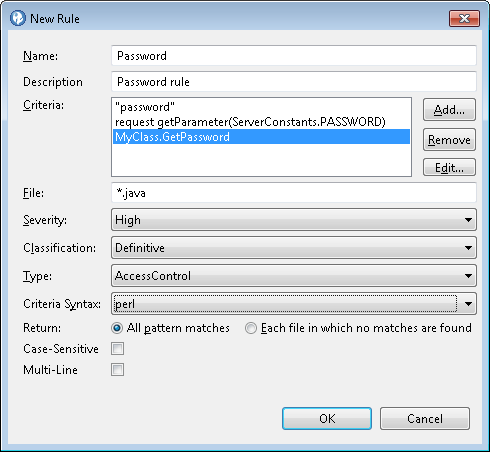Creating a pattern rule
Rules can be created in the Pattern Rule Library view, the Properties view for a project or application, or in a scan configuration.
Before you begin
Note: You must have Manage
Patterns permission
to be able to create pattern rules or rule sets - or to modify and
remove custom rules and rule sets.
Rules are created in the New Rule dialog box:
- To open this dialog box in the Pattern Rule Library view, click New Rule.
- In a scan configuration, select the Pattern Analysis tab and then select the Pattern analysis check box. In the Pattern Rules section of the tab, click Add to open the Add Pattern Rules dialog box. In this dialog box, click Create new rule to open the New Rule dialog box.
- To open this dialog box from the Properties view for a selected application or project, select the Rules and Rule Sets tab of the Properties view, click Add or right click inside the Rules section and select Add. Click New Rule in the Choose Rule dialog box.
Procedure
- In the New Rule dialog box, Name the rule.
- Optional: Add a Description for the rule.
- Add the Criteria. Click Add and type the regular expression for each rule.
- Identify the file type, such as *.java or *.xml. You can type any file type with or without wildcard characters.
- Optional: Select the Severity:
- High
- Medium
- Low
- Info
- Optional: Select the Classification:
- Definitive
- Suspect
- Scan Coverage
- Optional: Select the vulnerability
type to search for in the scan. (For more details about vulnerability
types, see the AppScan Source Security Knowledgebase)

- Optional: Select the criteria
syntax:
- egrep
- grep
- perl
- Optional: Identify if the results returned include All pattern matches or Each file in which no matches are found. When no matches are found, the pattern is an absence rule.
- Optional: Select the Case-Sensitive check box if the pattern match should be case-sensitive.
- Optional: Select the Multi-Line check box if the rule should match a pattern that spans across multiple lines.
- Click OK to verify that the regular expressions in the rule are valid. The rule is then added to the pattern rule library.